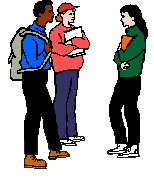Vocabulario: Hola, ¿Cómo estás?
Vocabulario: Hola, ¿Cómo estás?

Los Saludos |
|
Formal |
|
| Buenos días | Good morning |
| Buenas tardes | Good afternoon |
| Buenas noches | Good evening |
| ¿Cómo está? | How are you? |
| ¿Cómo le va? | How are you? |
| Familiar | |
| Hola | Hello; hi |
| ¿Qué tal? | How are you?; How is it going? |
| ¿Qué hay de nuevo? | What’s new? |
| ¿Qué onda? | What´s up? |
| ¿Qué hubo? | What´s up? |

Las despedidas |
Farewell |
|
|
Goodbye |
| Buenas noches | Good night |
| Chao (chau) | Bye |
| Hasta luego | See you later |
| Hasta mañana | See you tomorrow |
| Hasta pronto | See you soon |
| Hasta la próxima | See you next |
| Hasta la vista | See you later |
| Nos vemos | See you |
| Que le vaya bien | Hope it goes well (fare thee well) |
| Saludos a… | Greetings to… (say hello to) |
Expresiones de cortesía |
Courtesy Expressions |
|
|
Thank you |
| Muchas gracias (Mil gracias) | Thank you very much |
| De nada (por nada) | You are welcome |
| No hay de qué | You’re welcome |
| Por favor (por fa) | Please |
| Permiso (con permiso) | Pardon me; excuse me |
| Lo siento | I am sorry |
| Perdón | Pardon me; excuse me |
¿Cómo está? |
How are you? |
|
¿Cómo está usted? |
|
| ¿Cómo estás? | How are you? (fam.) |
| ¿Qué hay de nuevo? | What’s new? |
| ¿Qué pasa? | What’s happening?; What’s going on? |
| ¿Qué tal? | How are you?; How is it going? |
| (Muy) bien, gracias | (Very) well, thanks |
| Bastante bien | Pretty well |
| Nada | Nothing |
| No muy bien | Not very well |
| Regular | So-so; OK |
| Más o menos | So-so; OK |
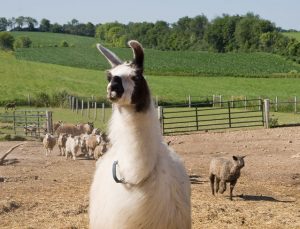
Presentaciones |
Introductions |
|
|
|
| ¿Cómo te llamas? | What’s your name? (fam.) |
| Me llamo… | My name is… |
| ¿Y tú? | And you? (fam.) |
| ¿Y usted? | And you? (form.) |
| Mucho gusto | Pleased to meet you |
| El gusto es mío | The pleasure is mine |
| Encantado/a | Delighted; Pleased to meet you |
| Igualmente |
Likewise |
| Es un placer | It´s a pleasure |
| Le presento a… | I would like to introduce you to (name). (form.) |
| Te presento a… | I would like to introduce you to (name). (fam.) |
¿De dónde es? |
Where are you from? |
|
¿De dónde es usted? |
Where are you from? (formal) |
| ¿De dónde eres? | Where are you from? (familiar) |
| Soy de. . . | I am from . . . |
Títulos / TitlesWhen speaking to someone in a formal situation we use titles before last names: |
|
|
señor (Sr.) |
Mr.; sir |
| señora (Sra.) | Mrs.; ma´am |
| señorita (Srta.) | Miss |
| doctor (Dr.) | Doctor (male) |
| doctora (Dra.) | Doctor (female) |
| Licenciado | Dr. (graduate) |
| Licenciada | Dra. |
| don and doña are used with first names to show respect.
don Pedro doña María
|
Sustantivos |
Nouns |
| La clase | class |
| La universidad | university |
| El cuaderno | notebook |
| El libro | book |
| El reloj | clock |
| El lápiz | pencil |
| El MAPA | map |
| El niño | little boy |
| La niña | little girl |
| El chico | boy |
| La chica | girl |
| El hombre | man |
| La mujer | woman |
| El profesor | professor (male) |
| La profesora | professor (female) |
| El estudiante | student (male) |
| La estudiante | student (female) |
| La casa | house |
| La mesa | table |
| La silla | chair |
Saludos, despedidas y expresiones de cortesía |
Can you tell the difference between formal and informal or familiar situations?
Situaciones formales
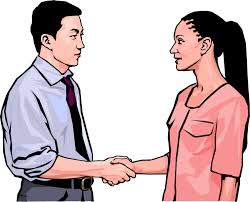
- María Martell: Buenos días, señor Ramirez.
Diego Ramirez: Buenos días, señora Martell, ¿Cómo está?
María Martell: Muy bien gracias, ¿Y usted?
Diego Ramirez: Bastante bien, gracias. Hasta luego.
María Martell: Adiós. - Lupe: Buenas tardes, profesor Banderas.
Antonio Banderas: Hola, ¿Cómo se llama usted, señorita?
Lupe: Me llamo Lupe García.
Antonio Banderas: Mucho gusto.
Lupe: Igualmente.
Antonio Banderas: ¿Y usted, de dónde es?
Lupe: Soy de México, ¿Y usted?
Antonio Banderas: De España. Nos vemos pronto Lupe.
Lupe: Sí profesor, Hasta luego.
Situaciones informales (familiares)
3. Carlos: Hola Patricia, ¿Qué tal?
Patricia: Hola Carlos, ¿Cómo estás?
Carlos: Muy bien, ¿Y tú?
Patricia: Más o menos. Nos vemos mañana, ¿sí?
Carlos: Bien. Nos vemos mañana. Adiós
Patricia: Chao.
4. Frida González: Hola, Me llamo Frida, ¿Y tú? ¿Cómo te llamas?
Pepe Flórez: Hola, Me llamo José, pero me puedes llamar Pepe (but you can call me Pepe).
Frida González: Encantada.
Pepe Flórez: Mucho gusto. ¿De dónde eres Frida?
Frida González: Soy de México, ¿Y tú?
Pepe Flórez: Yo soy de Chile.
Frida: ¡Qué bien!
 ACTIVIDAD #1
ACTIVIDAD #1
Categorías. Saludos, despedidas y presentaciones. Write whether the following words and phrases are saludos (greetings), despedidas (farewells),
or presentaciones (introductions).
¡Inténtalo!
- ¿Cómo está usted?
- Mucho gusto
- Te presento a María
- Hasta mañana
- Buenas noches
- ¿Qué hay de nuevo?
 ACTIVIDAD #2
ACTIVIDAD #2
Saludos y despedidas. Complete the following phrases with the appropriate expression from the given list.
Soy de España El gusto es mío Muy bien y ¿usted?
Nos vemos
- ¿Qué hay de nuevo?
- ¿Cómo te llamas?
- ¿Cómo está usted?
- Mucho gusto
- Adiós
- Muchas gracias
- ¿De dónde eres?
- Le presento a mi amigo Jorge
¡Inténtalo!
 ACTIVIDAD #3
ACTIVIDAD #3
Completar. Work with a partner to complete the following dialogues.
Ejemplo:
Estudiante 1: Buenos días, profesora Ramirez.
Estudiante 2: Buenos días clase.
- Estudiante 1: Hola, ¿Qué tal?
Estudiante 2: - Estudiante 1 : ¿Cómo te llamas?
Estudiante 2: - Estudiante 1:
Estudiante 2: Soy de Colombia. - Estudiante 1:
Estudiante 2: Muy bien y ¿tú? - Estudiante 1: Hasta pronto
Estudiante 2:
 ACTIVIDAD #4
ACTIVIDAD #4
Traducir. WRITE-PAIR-SHARE. Translate the following words into Spanish, then pair with a partner and compare your answers.
| See you! | |
| Excuse me | |
| How do you say…..? | |
| What is your name? | |
| Yes, of course! | |
| What´s up? | |
| My name is… | |
| How are you? | |
| Good morning | |
| Good afternoon |
 ACTIVIDAD #5
ACTIVIDAD #5
Conversaciones. In groups of three, write five short conversations based on what the people in these pictures would say.
1
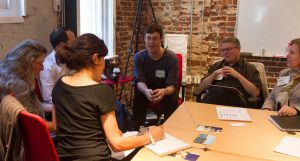
2
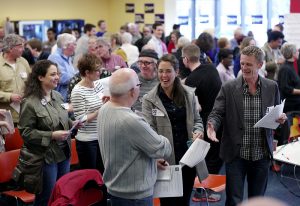
3
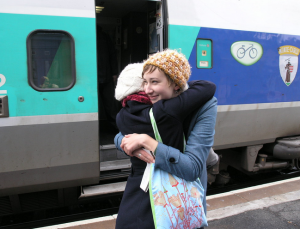
4

5
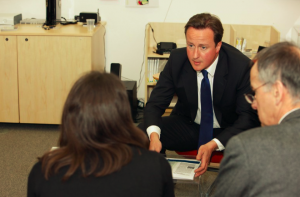
 ACTIVIDAD #6
ACTIVIDAD #6
Situaciones. It is the first day of class and you are very excited to meet your new classmates in your SPA class! You decide to get to know TWO students who are sitting next to you. With a big smile:
- Say hi and introduce yourself
- Ask him/her what is his/her name
- Tell him/her that you are pleased to meet them
- Ask them where are they from
- Say goodbye
